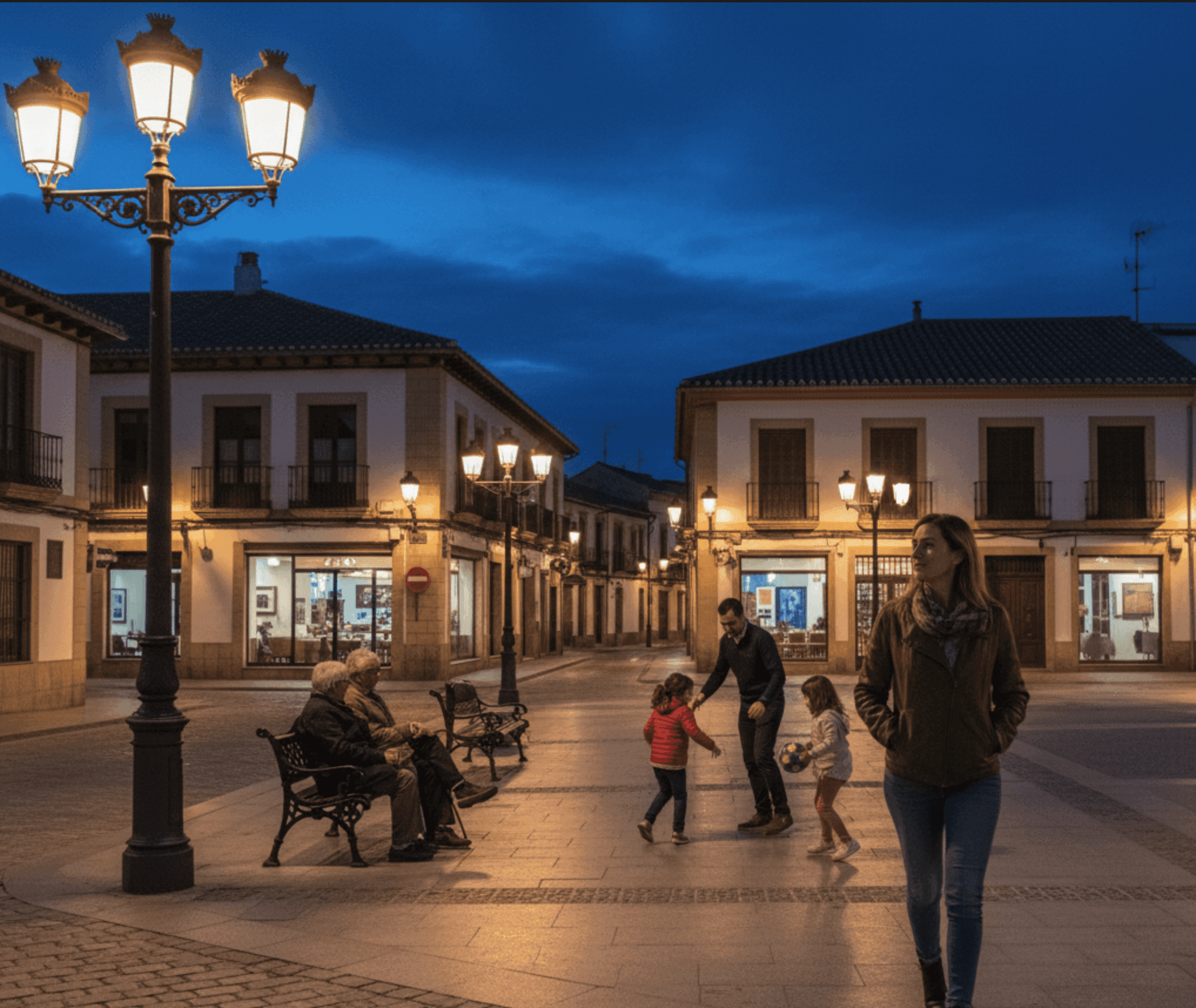Property Owners
Discover the Benefits of Expat Rentals
Rent out your apartment with Globexs


Rent out your apartment with Globexs



Why Americans are really choosing Spain: safety, community, and work-life balance that changes everything. Beyond beaches—the truth about 15,000+ relocations.
In 2024, Spain issued more first-time residence permits to Americans than any other European country — 15,638 to be exact, surpassing France, Germany, and the Netherlands combined. As a relocation company that's been operating in Spain since 2002, we've watched this wave of American migration firsthand. And we've noticed something fascinating: what brings people here and what makes them stay are completely different things.
Most arrive talking about Mediterranean climate and affordable wine. Six months later, they're talking about something else entirely.
Here's a conversation we have regularly with American women in Valencia: they describe going for evening runs alone, walking home from dinner at midnight, or letting their teenagers take the metro without constant anxiety. Then they pause and say something like, "I didn't realize how much mental space fear was taking up until I didn't have to carry it anymore."
The numbers tell part of the story. Spain's intentional homicide rate is 0.6 per 100,000 people. The United States sits at 6.3 — literally ten times higher. The 2024 Global Peace Index ranks Spain 23rd globally for safety; the US is 132nd.
But statistics don't capture the psychological shift. We're talking about Americans who haven't heard gunshots in their neighborhood for the first year in a decade. Parents who don't do active shooter drills mentally when dropping kids at school. The absence of ambient fear changes how you move through the world.
Yes, petty theft exists here, especially pickpocketing in tourist zones. But there's a fundamental difference between "someone might steal my phone" and "someone might shoot me." One is an inconvenience. The other is existential dread.
American productivity culture trains you to optimize every moment. Spain's culture teaches something else: that the moment itself is the point.
Take "sobremesa" — the practice of staying at the table long after the meal is finished, talking, laughing, sometimes for hours. There's no English equivalent because the concept doesn't exist in American culture. You finish eating, you leave. The table needs to turn. Time is money.
In Spain, time is life. And life is measured in conversations, not transactions.
We watch Americans go through a predictable transformation. First month: frustration that shops close for lunch, that dinner isn't until 9 PM, that everything takes longer than "necessary." Third month: they're defending the siesta to visiting relatives. Sixth month: they can't imagine living any other way.
The Spanish concept of "mañana" isn't procrastination — it's a recognition that human relationships matter more than efficiency metrics. When your neighbor stops you on the street to chat for 20 minutes, you're not losing time. You're living in a society that still believes knowing your neighbors matters.
In the United States, "community" has become something you join — a co-working space, an online group, a subscription service. In Spain, community is just where you live.
Your local shopkeepers know your name. The pharmacy remembers your kids' birthdays. The baker asks how your mother's surgery went because your neighbor mentioned it to them. This isn't small-town life — this happens in cities of millions.
The practice of "dos besos" (greeting with two cheek kisses) signals something deeper: physical proximity is normal, not threatening. Conversations happen at closer distances. Eye contact is sustained. Personal questions aren't invasive — they're how people show they care about your actual life.
According to recent surveys, 76% of expats in Spain report feeling welcomed by locals, compared to 67% globally. That 9-point difference represents thousands of daily interactions where Americans feel included rather than tolerated.
What Americans discover is that "vecindad" (neighborhood solidarity) isn't nostalgia for a bygone era. It's how Spain currently functions. The infrastructure of daily life assumes you know the people around you.
Tapas bars aren't restaurants. They're social infrastructure.
The model is simple: you don't make a reservation, sit down for two hours, and leave. You hop between several places, trying different dishes, running into people you know, starting conversations with strangers at the bar. You pay when you're ready to go, and nobody rushes you.
This removes the formality and expense that makes American dining out a special occasion. In Spain, going out for tapas is what you do on a Tuesday night because you don't feel like cooking. It's accessible, spontaneous, and inherently social.
Weekend family meals with three generations aren't aspirational — they're default. Not "we should get together sometime" but actual weekly gatherings where extended families share food and time. For Americans from isolated suburban nuclear families or lonely urban apartments, this model feels revolutionary.
The culture around food reveals a broader value system: meals are for connecting, not just refueling. The ritual matters as much as the nutrition.
Spain consistently ranks in the top 5 countries globally for quality of life. Here's what that looks like in practice:
Stores close for lunch. Initially frustrating for Americans used to 24/7 availability. Then you realize the employees are home eating with their families instead of inhaling sad desk salads. The entire economy is structured around humans, not consumer convenience.
August is sacred. Many businesses slow down or close entirely for vacation. Not "checking email from the beach" — actual disconnection. The cultural message is clear: rest matters more than constant availability.
Children play outside until 10 PM in summer. Because streets are safe, walkable, and full of community eyes. Parents sit at outdoor cafes while kids run around plazas. Collective supervision replaces paranoid hovering.
For Americans conditioned to treat exhaustion as a badge of honor, Spain's approach feels like permission to be human. You work to fund your life, not the other way around.
Spain's healthcare system is public, accessible, and high-quality. Once you're registered — through employment, residency, or private insurance — you get a Tarjeta Sanitaria providing access to doctors, hospitals, and medications at minimal or zero cost.
Americans paying $500-1,500 monthly for family insurance back home are shocked by stories like: full health screening, specialist consultation, MRI scan — total cost €60. What would be $5,000+ in the US even with insurance.
But the deeper relief is psychological: your healthcare isn't tied to your job. You can take career risks, start a business, or switch industries without gambling with your family's medical access. That freedom is profound.
The difference between "I need to keep this job for the insurance" and "I can pursue the work that matters to me" changes entire life trajectories.
Spain isn't paradise. The bureaucracy is genuinely Byzantine. Language barriers are real. Salaries are significantly lower than comparable US positions.
Getting your NIE (foreign identity number), opening a bank account, registering for healthcare, understanding visa requirements — none of it is impossible, but it's complex enough that many people give up in frustration.
This is exactly why professional support matters. Over 20+ years working with American relocations, we've learned that success requires more than paperwork guidance. It requires community integration.
That's why at Globexs we structure everything around cultural transition, not just legal compliance. Our temporary furnished apartments (1-11 month contracts with all utilities included in one invoice) give people time to explore neighborhoods before committing. Our comprehensive legal team handles visas, NIE applications, and documentation complexity. And our twice-monthly social events create the connections that transform relocation from stressful to sustainable.
Because we understand something fundamental: you can have perfect documents and still be miserable. Real success happens when you feel connected, supported, and part of something larger than yourself.
Americans don't stay in Spain for the architecture or the wine. They stay because Spain still operates on a value system that prioritizes human wellbeing over economic optimization.
They stay because you can walk home at 2 AM without fear. Because neighbors know your name and actually care. Because healthcare won't bankrupt you. Because "how are you?" is a genuine question, not a reflex.
They stay because Spain offers something increasingly rare in American life: the daily experience of being part of a functioning community. Not through forced enthusiasm or corporate team-building, but through the simple architecture of daily life that assumes human connection matters.
The Mediterranean sun is lovely. The food is exceptional. The history is rich. But those aren't why people build lives here.
People stay because once you've experienced "sobremesa" — that unhurried post-meal conversation where you're just present with people you care about — it's hard to go back to eating lunch at your desk while answering Slack messages.
They stay because Spain remembers something the United States increasingly forgets: that prosperity means a better life, not just more money to cope with a worse one.
That's the real story behind 15,638 American residence permits. It's not a migration to a new country. It's a migration to a different way of being human.
Thinking about relocating to Spain? We've spent over two decades helping Americans navigate not just the paperwork, but the cultural transition that determines whether relocation succeeds or fails. From temporary housing to legal documentation to community integration, we understand that successful relocation is about building a life, not just changing addresses. Contact us to learn how we can help make your move sustainable and fulfilling.